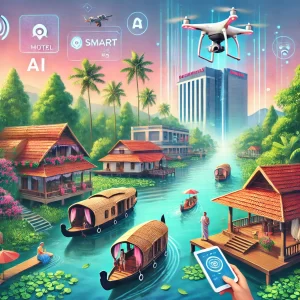“How SpaceTech Companies in Kerala Are Contributing to ISRO’s Missions”

Kerala, known for its picturesque landscapes, vibrant culture, and booming tourism industry, is also emerging as a key player in India’s ambitious space exploration journey. The Indian Space Research Organisation (ISRO), headquartered in Bengaluru, has long been a symbol of scientific excellence. But behind its groundbreaking missions lies a network of dedicated contributors — including several SpaceTech companies from Kerala — that provide crucial technologies, innovations, and support.
From satellite components to propulsion systems, Kerala’s aerospace sector is quietly shaping the future of space exploration. Let’s explore how these companies are making an impact, driving technological advancements, and helping ISRO reach new heights.
Kerala’s Growing SpaceTech Ecosystem
Kerala’s journey into the aerospace industry isn’t sudden. The state has fostered a strong engineering and manufacturing culture for decades, backed by institutions like Vikram Sarabhai Space Centre (VSSC) in Thiruvananthapuram. Over time, this environment nurtured a cluster of specialized SpaceTech companies, each contributing to different aspects of space missions.
Some of the key sectors these companies support include:
- Satellite manufacturing and components
- Avionics and communication systems
- Propulsion technology and rocket parts
- Advanced materials and electronics
- Software development for space operations
Key SpaceTech Companies in Kerala Supporting ISRO
1. Ananth Technologies Limited (ATL)
Ananth Technologies has played a pivotal role in ISRO’s satellite programs. With a facility in Thiruvananthapuram, ATL specializes in building avionics packages, sensors, and control systems for both satellites and launch vehicles.
Contributions to ISRO:
- Developed critical components for Mars Orbiter Mission (Mangalyaan) and Chandrayaan-2.
- Supplies telemetry systems, which help monitor rockets and satellites in flight.
- Supports navigation and communication satellites, ensuring precise in-orbit operations.
2. Keltron (Kerala State Electronics Development Corporation Limited)
A government-run enterprise, Keltron has long been an essential supplier of electronic components to ISRO. Established in 1973, Keltron’s aerospace division manufactures a range of high-reliability electronics crucial to space missions.
Key Achievements:
- Supplies power modules and control systems for launch vehicles.
- Developed specialized printed circuit boards (PCBs) used in satellite communication systems.
- Contributed to ISRO’s PSLV and GSLV programs.
3. SFO Technologies
Part of the NeST Group, SFO Technologies operates a high-end manufacturing unit in Kochi. The company focuses on advanced electronics, avionics, and mission-critical systems — vital for both defense and space sectors.
Notable Contributions:
- Designs avionics subsystems used in satellites and rockets.
- Supports thermal management systems, ensuring spacecraft withstands extreme temperatures.
- Supplies parts for ISRO’s Reusable Launch Vehicle (RLV) program — a project aimed at developing India’s own spaceplane.
4. Avantel Limited
Specializing in satellite communication technologies, Avantel has provided transponders and tracking equipment for various ISRO missions. The company ensures robust connectivity between ground stations and satellites.
Key Roles:
- Supplied S-band transponders used in ISRO’s GSAT communication satellites.
- Supports maritime communication — crucial for tracking vessels via satellite.
- Helps ISRO develop Earth Observation Satellites (EOS) for environmental monitoring.
Innovations From Kerala: Pushing the Boundaries of SpaceTech
Beyond manufacturing components, Kerala-based companies are pioneering innovative technologies to enhance ISRO’s capabilities. Here’s a look at some groundbreaking contributions:
1. Lightweight Materials for Satellites and Rockets
Companies in Kerala are experimenting with carbon composites and 3D-printed aerospace parts. These materials reduce satellite weight — allowing ISRO to carry more payloads per mission — and improve fuel efficiency in rockets.
2. Miniaturized Electronics
With satellites getting smaller, Kerala’s tech firms are developing compact, high-performance electronics. This is particularly crucial for ISRO’s CubeSat and microsatellite programs, which aim to launch small, cost-effective satellites for scientific research and communication.
3. AI and Data Processing
Several startups are diving into Artificial Intelligence (AI) and Machine Learning (ML) to help ISRO process vast amounts of data collected from space missions — from weather monitoring to planetary exploration.
Training and Talent: Kerala’s Role in Building the Future Workforce
Kerala’s academic institutions also play a huge role in nurturing talent for ISRO’s missions. Indian Institute of Space Science and Technology (IIST), located in Thiruvananthapuram, is directly supported by ISRO and produces some of the country’s finest aerospace engineers.
Additionally, several universities collaborate with ISRO on research projects, especially in satellite technology, remote sensing, and propulsion systems — ensuring a steady pipeline of skilled professionals and researchers.
Kerala’s Vision for the Future of SpaceTech
Looking ahead, Kerala’s aerospace companies aim to deepen their collaboration with ISRO, particularly in upcoming missions like:
- Gaganyaan: India’s first crewed space mission, planned for launch soon.
- Chandrayaan-3: A follow-up lunar exploration mission.
- Aditya-L1: India’s first solar observation mission.
- Reusable Rockets and Spaceplanes: A game-changer in making space travel more cost-effective.
Moreover, Kerala is positioning itself as a hub for private space startups, inspired by the Indian government’s push for privatization in the space sector.
Final Thoughts: Kerala’s Rising Star in India’s Space Journey
Kerala’s contributions to ISRO’s missions are proof that innovation isn’t confined to major tech cities like Bengaluru or Hyderabad. The state’s SpaceTech companies — backed by a skilled workforce, cutting-edge research, and government support — are proving to be indispensable partners in India’s space ambitions.
As ISRO sets its sights on Mars, the Moon, and beyond, Kerala’s aerospace ecosystem will undoubtedly continue to play a vital role in making these dreams a reality.
Would you like me to dive into specific ISRO missions or Kerala’s upcoming SpaceTech startups in a follow-up article?




 Kochi, often called the “Queen of the Arabian Sea,” has been a historic port city renowned for its spice trade, cultural diversity, and strategic location. Over the past decade, however, Kochi has evolved into more than just a tourist destination or commercial hub. Today, it’s rapidly emerging as a leading tech hub in India, offering a thriving ecosystem for startups and established companies alike. This article explores the key drivers behind Kochi’s rise in the tech world—especially Infopark and KINFRA—and examines the abundant opportunities that await tartups looking to make their mark.
Kochi, often called the “Queen of the Arabian Sea,” has been a historic port city renowned for its spice trade, cultural diversity, and strategic location. Over the past decade, however, Kochi has evolved into more than just a tourist destination or commercial hub. Today, it’s rapidly emerging as a leading tech hub in India, offering a thriving ecosystem for startups and established companies alike. This article explores the key drivers behind Kochi’s rise in the tech world—especially Infopark and KINFRA—and examines the abundant opportunities that await tartups looking to make their mark.


